
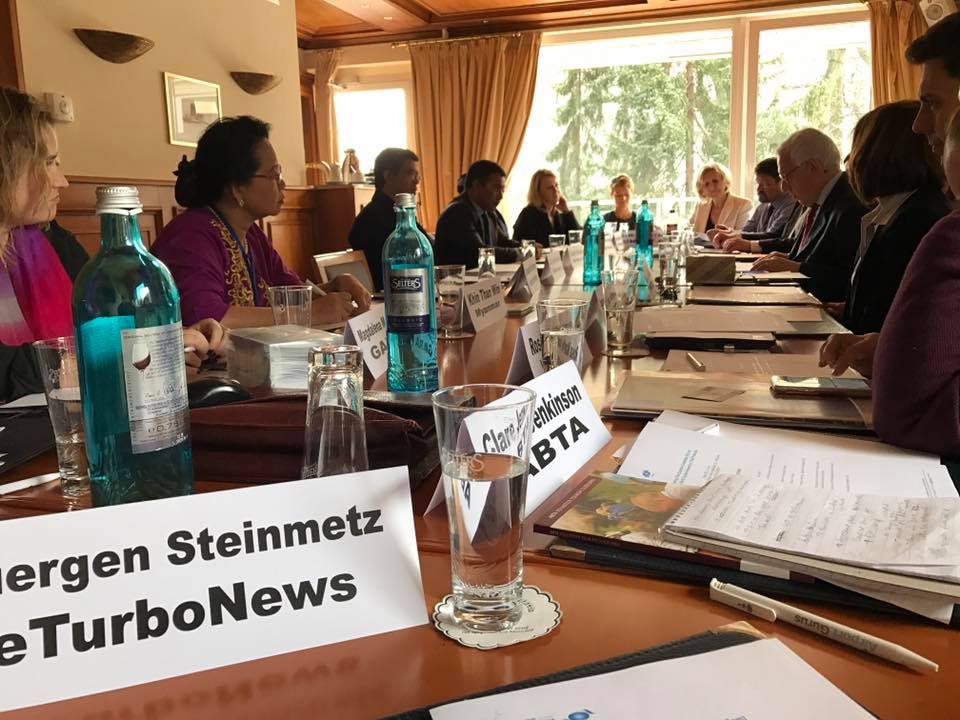
World Tourism Network on Child Protection Executive Committee meets in Berlin
Today in Berlin at Villa Kastaia hotel the Executive Committee (ExCom) of the World Tourism Network on Child Protection by UNWTO had it’s yearly meeting on the sideline of ITB Berlin.
Attending
Chair
Carol Bellamy
Governments
H.E. Najib Balala, Minister of Tourism of Kenya
Widad Sherman, Chief of Staff, Ministry of Tourism, Kenya
Tokiaritefy Rabeson, General Director of Tourism Development, Ministry of Tourism, Madagascar
Khin Than Win, Deputy Director General, Ministry of Hotels and Tourism, Myanmar
Zeyar Myo Aung, Director, Tourism Promotion, Ministry of Hotels and Tourism, Myanmar
Magdalena Montero, Adviser to the Minister of Tourism of Uruguay and Representative of the Regional Task Force for the Protection of Children in Travel and Tourism of the Americas (GARA)
Law Enforcement
Mohamed Basheer, Chief Inspector, Head of Family and Child Protection Department, Maldives Police Service
Private sector
Arnaud Herrmann, VP Sustainable Development, Accor Hotels
Andreas Mueseler, Chairman of the Sustainability Committee, German Travel Association (DRV)
Nikki White, Head of Destinations and Sustainability, ABTA
Elise Allart, Manager of Sustainable Development, TUI Benelux & TUI Group 2
Civil Society/NGOs
Joanna Rubinstein, President & CEO, World Childhood Foundation USA
Dorothy Rozga, Executive Director, ECPAT International
Rosa Martha Brown, President and Founder of Infantia Foundation & International Federation of Executive Women in Travel (FIASEET), Mexico
Media
Juergen Steinmetz, Publisher and President, eTurboNews
International Organizations
Beth Verhey, Senior Advisor, Children’s Rights and Business, UNICEF
Simon Steyne, Senior Adviser of the Fundamental Principles and Rights at Work, ILO
UNWTO Secretariat
Márcio Favilla L. de Paula, Executive Director
Marina Diotallevi, Head, Ethics and Social Responsibility Programme
Igor Stefanovic, Senior Programme Assistant, Ethics and Social Responsibility
Observer
Ms. Alice Akunga, Country Representative, UNICEF Maldives
After welcoming remarks by Márcio Favilla L. de Paula, Executive Director, UNWTO, discussed was the upcoming special session at ITB 2017 entitled; Governments as champions of child protection in tourism
Uruguay presented best practices on Tourism and prevention of sexual exploitation of children in the Americas
The Modern Slavery Act and its implications for tourism industry stakeholders was introduced by ABTA. The Approach of the Association of British Travel Agents (ABTA) had an interesting program among its members
Further discussed: Best practices by ExCom participants: Putting child protection in the context of the Int’l Year of Sustainable Tourism for Development / implementation of Sustainable Development Goals (SDGs)
Advancing youth empowerment through travel and tourism: UNWTO/Amadeus/Government of Kenya pilot project in Nairobi

Tourism opens our hearts and our minds: UNWTO Secretary-General at ITB Berlin
Tourism can transform our world and build better understanding in a world living a deficit of tolerance said UNWTO Secretary-General, Taleb Rifai, at the opening ceremony of the 2017 edition of ITB Berlin (Berlin, Germany, 7 March 2016).
“We live the worst of times and the best of times. Times when we wake up every other day with the threat of terrorism at our doorstep and the glooming numbers of unemployment. Times of isolationism and ill-conceived actions like travel bans, which do not lead to increased security but just to growing tension. Despite all these complex and interlinked challenges, despite acts against the freedom of travel, the power of tourism continues to shine through the darkness” said Mr Rifai.
Quoting the United Nations Secretary-General, Antonio Guterres, he said, “Beyond the measurable advances that tourism can make possible, it is also a bridge to better mutual understanding among people from all walks of life.”
In this context, Mr Rifai recalled the declaration of 2017 as the International Year of Sustainable Tourism for Development by the United Nations is a clear recognition of the potential contribution of tourism to social progress, equality and prosperity and peace and that tourism must be at the forefront of the 2020 Agenda for Sustainable Development.
“In a world that seems increasingly short of tolerance and generosity, we should cherish tourism as a precious pillar of peace amongst communities and nations.“ he said.
“We all need to ensure that, as our sector grows, it contributes to the wellbeing of the world and not to its peril. Tourism must fulfil its responsibility to contribute to all 17 universal Sustainable Development Goals” he added.

Silk Road destinations committed to sustainable tourism
The 7th UNWTO Silk Road Ministers Meeting held at ITB Berlin on 8 March 2017 focused on how to foster sustainable tourism development along the Silk Road. Held within the framework of the International Year of Sustainable Tourism for Development 2017, 31 countries from the Silk Road and beyond exchanged best-practices on how to advance the contribution of tourism to the Sustainable Development Goals (SDGs).
Addressing the meeting and setting the tone for the ministerial debate, UNWTO Secretary-General, Taleb Rifai, said “2015 was a landmark year with the approval of the universal SDGs by the international community. Tourism can contribute to all 17 Goals. Indeed, if properly managed, tourism can positively help address all the interconnected challenges facing people and planet including ending poverty, promoting gender equality, fostering jobs and inclusive growth and fighting climate change”.
Moderated by Christa Larwood from the BBC, ministers and high level officials shared their views and experiences in promoting sustainable tourism, in areas of heritage protection, community participation, sustainable business practices and the development of niche tourism itineraries and products. Two presentations, the celebration of the World Nomad Games in Kyrgyzstan and community integration in West Bengal (India), highlighted the potential and multiple benefits to be derived from a sustainable tourism path.
Important input was also contributed by UNWTO Affiliate Member, TripAdvisor, who presented the findings of the TripAdvisor Travel Trends for the Silk Road 2017. For the second consecutive year, TripAdvisor conducted a specialised consumer survey assessing travel preferences, habits and interests along the Silk Road. Research higlights that among top interest areas while travelling along the Silk Road are visiting UNESCO World Heritage Sites, experiencing local gastronomy and attending local festivals and events.
The UNWTO Silk Road Programme is a collaborative initiative designed to enhance sustainable tourism development along the historic Silk Road routes. It aims to maximize the benefits of tourism development for local Silk Road communities, while stimulating investment and promoting the conservation of the route’s natural and cultural heritage. Currently the Silk Road Programme engages 33 UNWTO Members States, UN agencies, UNWTO Affiliate Members, as well as an extensive network of private sector stakeholders.

World Bank Partners with Jamaica and UNWTO to Stage Global Tourism Conference
KINGSTON, Jamaica; March 7, 2017: Minister of Tourism, Hon. Edmund Bartlett has announced that the World Bank has agreed to partner with Jamaica and the United Nations World Tourism Organization (UNWTO) in staging the historic Global Conference on Building Partnerships for Sustainable Tourism for Development, which will be staged from November 27 to 29 at the Montego Bay Convention Centre, St. James. The move is aimed at boosting the global impact and positioning of the conference.
Speaking at the first press briefing for global media, which was jointly held by the Ministry and the UNWTO in Germany today (March 7, 2017), UNWTO Secretary General, Mr. Taleb Rifai introduced the new partner. Minister Bartlett in addressing the gathering said he believes that the conference has now been set on a new and interesting path with the inclusion of such a major partner.
“The inclusion of the World Bank as a partner will be a ‘game-changer’ in terms of how the conference is positioned. It will go way beyond the limits of a technical conference, but will be transactional and business oriented,” Minister Bartlett noted.
He added that “the addition of the World Bank will provide a grand opportunity for international funders of tourism to meet with Ministers as well as private and public sector entities that have development projects and are able to access funding through these entities. So Jamaica will be the destination where many of these major sustainable tourism development transactions will actually take place.”
Mr. Bartlett, who is also the Chairman of the Board of Affiliate Members of the UNWTO, went on to explain that the addition of the World Bank to the initial partners – the Government of Jamaica, international development firm Chemonics International and the UNWTO – will broaden the concept from being environmentally driven to now include themes such as economic development, financial management, job creation and human capital development.
The conference is of great historical significance as it will mark the first time that the UNWTO and its affiliate members will stage a world conference on tourism in the Caribbean or the Americas overall.
“This conference is so important to us in Jamaica and by extension the world. Here we are, for the first time saying that tourism is a catalyst for global peace on the political side, for economic development on the community side and for people enhancement through the whole business of development and training,” he said.
The Minister also disclosed that the next global media session with the World Bank will be in Bangkok, Thailand where the partners will meet with the World Travel and Tourism Council (WTTC).
The first briefing formed part of a series of activities for Minister Bartlett and a high-level delegation of tourism officials who are currently attending the largest tourism tradeshow in the world – ITB Berlin, in Germany. While there the Minister has been seeking to promote the destination and encourage investment in the country’s tourism industry through the Ministry’s Shovel Ready initiative. The Minister is expected to return to the island on March 15, 2017.
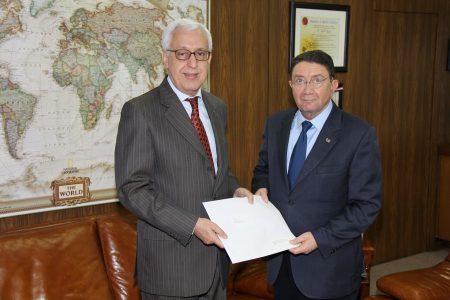
It’s official: Márcio Favilla Lucca de Paula presents papers to UNWTO Secretary Taleb Rifai
Today, Mr. Marcio Favilla Lucca de Paula made it official. In Madrid, he handed his documents to compete for the UNWTO Secretary General position to current Secretary-General Taleb Rifai.
Mr. Favilla Lucca de Paula is currently Executive Director for Competitiveness, External Relations and Partnerships at the World Tourism Organization (UNWTO) based in Madrid, Spain. He has been in this position since January 2010.
From April 2007, Mr. Favilla Lucca de Paula was Vice Minister of the Secretariat of Institutional Relations of the Presidency of Brazil.
Prior to this appointment, he was Brazil’s first Vice Minister of Tourism (2003-2007) where he played a key role in the structuring of the first exclusive Ministry of Tourism in Brazil.
During his term as Vice Minister of Tourism he was actively involved in the development and implementation of the 1st National Tourism Plan and worked to increase both tourism arrivals into the country as well as domestic tourism.
He was also engaged in many of UNWTO’s activities as Head of the Brazilian delegation to all General Assembly and Executive Council sessions from 2003 to 2006, and Chairman of the UNWTO Commission for the Americas in 2006.
From 1999 to 2002 he worked at the Ministry of Development, Industry and International Trade as Head of the National Department for Business Registry among other positions.
Mr. Favilla Lucca de Paula was in Belo Horizonte from 1980 to 1998, first at the Development Bank of Minas Gerais and then the State Secretariat for Finance of Minas Gerais.
Mr. Favilla Lucca de Paula has a MA in Development Studies from the Institute of Social Studies, The Hague, Netherlands, where he specialized in Regional Development Planning (1985-1986). He obtained his undergraduate degree in Economics from the Federal University of Minas Gerais (1979).
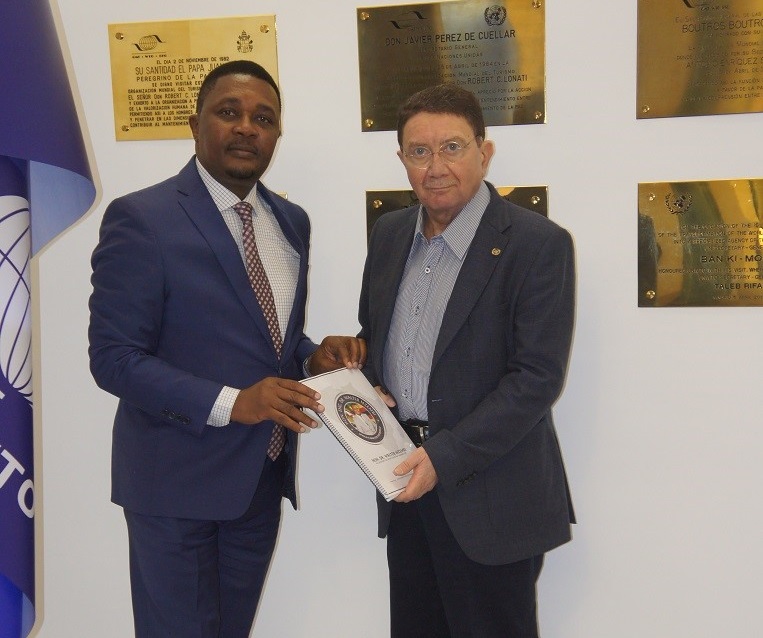
Hon Walter Mzembi deposits his official nomination papers as a candidate for the post of Secretary General of the United Nations World Tourism Organisation (UNWTO)
At a brief ceremony held the Madrid Headquarters of the United Nations World Tourism Organisation (UNWTO) at 20.00 hours on Saturday 4 March 2017, Dr Walter Mzembi, the African Union-endorsed candidate for the post of Secretary General of the UNWTO, deposited his official nomination papers with the incumbent Secretary General, Dr Taleb RIfai.
Although the deadline for the deposit of the papers is midnight on the 11 March, 2017, Dr Mzembi decided to detour through Madrid at the beginning of his current campaign outreach programme, to lodge the requisite documentation directly with the Secretary General a week before the agreed cut-off date.
Witnessing the occasion was Dr Mzembi’s wife, Mrs Barbara Perez Hernandez, the wife of the incumbent Secretary General, Mrs Rifai, the UNWTO Legal Counsel, Ms Elcia de Grandcourt, UNWTO Regional Director for Africa and members of Dr Mzembi’s campaign team.
The documentation submitted by Dr Mzembi included an official nomination letter signed by His Excellency President R.G. Mugabe, a 2-page curriculum vitae, a-6-page Statement of Policy and Management Intent and a Certification of Sound Health.
The core document of the submission is the 6-page Statement of Policy and Management – which basically sets out the vision Dr Mzembi, as Secretary General, has for the future development of global tourism under the umbrella of the UNWTO.
That vision is all-encompassing in nature, reflects Dr Mzembi’s ambitious 10-Point Plan for the reform and renewal of the Organisation and provides a clear road-map signposting how he intends to attain the targets articulated in that Plan.
Key elements of his reform agenda, as highlighted in his Statement of Policy and Management Intent, include
• Administrative and Governance Reform of the Organisation
• Responsible Tourism and Sustainability
• Resource Mobilisation and Business Development, and
• Organisational Repositioning and Brand Development
In receiving the official nomination documentation, Secretary General Rifai thanked Dr Mzembi for making the effort to personally deposit the requisite paperwork, congratulated him on his impressive campaign effort to date and wished him well in the forthcoming election.
The election of a new Secretary General will take place during the course of the forthcoming 105th meeting of the UNWTO Executive Council which is scheduled to be held in Madrid, Spain, from 11 to 12 May, 2017.
To date, in addition to Dr Mzembi, there are four other candidates who have officially declared their candidature for the Secretary General post.
They are Mrs Doh Young-shim of the Republic of (South) Korea, Ambassador Gurab Poloshikavili of the Republic of Georgia, Mr Marcio Favilla Luca de Paula of Brazil and Mr Alain St Ange of the Seychelles.
The election will be conducted by secret ballot. To win, a candidate requires a 50%-plus-1tally from the Executive Council members present and voting. If all 33 members of the Executive Council are present and voting, this means that a candidate needs to secure a minimum of 17 votes in order to win the election.
Emerging from the election, therefore, will be a Secretary-General-elect. The Chairperson of the Executive Council will then submit the name of the winning candidate – the Secretary-General elect – for endorsement by the next UNWTO General Assembly which is scheduled to take place in Chengdu, China, in September, 2017. That endorsement requires a two-thirds majority of the UNWTO members present and voting.
The new Secretary General will take up the post on 1 January, 2018 and will serve a 4-year mandate until 31 December 2021. That mandate is renewable once, for a further four-year period.
Following the submission of his nomination documentation, Dr Mzembi left Madrid for Ghana where, as part of His Excellency President Mugabe’s entourage, he attended the 60th Anniversary Celebrations of Ghanaian independence.
Dr Mzembi held a bilateral meeting with his Ghanaian counterpart, Hon Catherine Afeku – Minister of Tourism, Culture and the Creative Arts – to discuss the strengthening of cooperation in the field of tourism between the two countries on the basis of an MoU which, they agreed, should be finalised as soon as possible.
Harare
6 March 2017
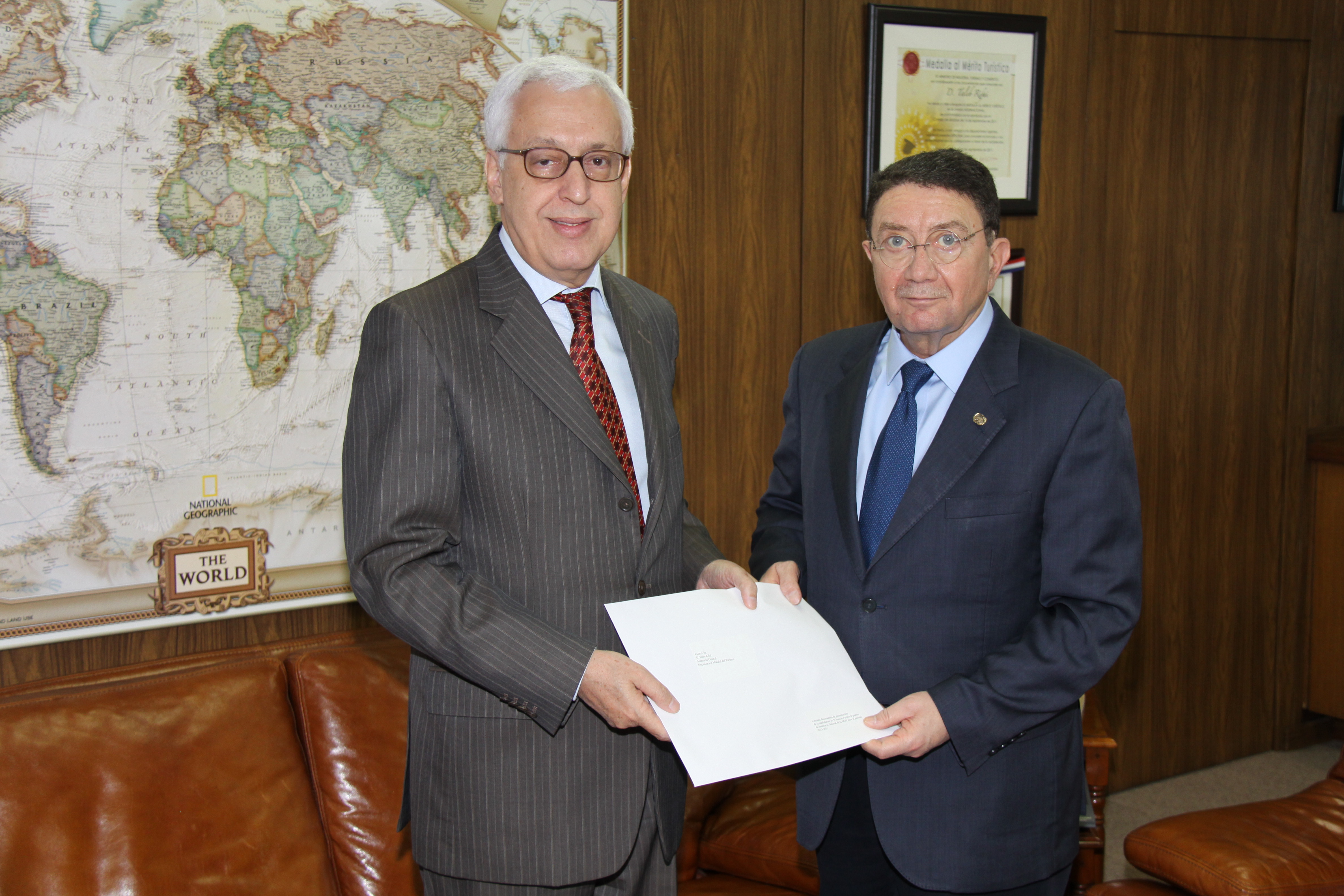
Márcio Favilla presents his papers to UNWTO Secretary General
Márcio Favilla made it official today. Today in Madrid, Mr. Favillo handed his documents to compete for the UNWTO Secretary General position to current Secretary-General Taleb Rifai.
Mr. Favilla Lucca de Paula is currently Executive Director for Competitiveness, External Relations and Partnerships at the World Tourism Organization (UNWTO) based in Madrid, Spain. He has been in this position since January 2010.
From April 2007, Mr. Favilla Lucca de Paula was Vice Minister of the Secretariat of Institutional Relations of the Presidency of Brazil.
Prior to this appointment, he was Brazil’s first Vice Minister of Tourism (2003-2007) where he played a key role in the structuring of the first exclusive Ministry of Tourism in Brazil.
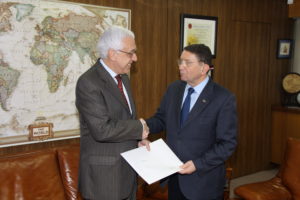
During his term as Vice Minister of Tourism he was actively involved in the development and implementation of the 1st National Tourism Plan and worked to increase both tourism arrivals into the country as well as domestic tourism.
He was also engaged in many of UNWTO’s activities as Head of the Brazilian delegation to all General Assembly and Executive Council sessions from 2003 to 2006, and Chairman of the UNWTO Commission for the Americas in 2006.
From 1999 to 2002 he worked at the Ministry of Development, Industry and International Trade as Head of the National Department for Business Registry among other positions.
Mr. Favilla Lucca de Paula was in Belo Horizonte from 1980 to 1998, first at the Development Bank of Minas Gerais and then the State Secretariat for Finance of Minas Gerais.
Mr. Favilla Lucca de Paula has a MA in Development Studies from the Institute of Social Studies, The Hague, Netherlands, where he specialized in Regional Development Planning (1985-1986). He obtained his undergraduate degree in Economics from the Federal University of Minas Gerais (1979).
Mr. Favilla Lucca de Paula is a Brazilian national, born in 1958.

UNWTO advances the conversion of the Code of Ethics into an international Convention
The World Tourism Organization (UNWTO) is working to convert the UNWTO Global Code of Ethics for Tourism into an international Convention, in order to increase the commitment of all stakeholders to its principles. The process is being led by an intergovernmental Working Group composed of representatives of 36 UNWTO Member States.
While extremely relevant for the tourism sector, the UNWTO Global Code of Ethics for Tourism, adopted in 1999, represents a voluntary instrument whereas, the future Convention on Tourism Ethics would constitute a binding instrument.
“For UNWTO to have its first International Convention based on its cornerstone policy document would be of great significance, especially at a time when the uninterrupted growth of international tourist arrivals has reached a record of 1.2 billion in 2016, doubling the figures of tourism in 1999, year in which the Global Code of Ethics was adopted”, said UNWTO Secretary-General, Taleb Rifai.
The Working Group on the UNWTO Convention on Tourism Ethics discussed the text of the Draft Convention during two intense working sessions in its second meeting, held on 30-31 January 2017. The draft text will now be presented to the 105th session of the UNWTO Executive Council, to be held on 11-12 May 2017 in Madrid, Spain. The Executive Council will then be followed by a third meeting of the Working Group to which UNWTO Full and Associate Members are invited to participate.
Following the roadmap agreed by the Working Group, the Convention will be presented for consideration and possible adoption to the 22nd UNWTO General Assembly, to take place in Chengdu, China, on 6-9 September 2017.
If approved, the Convention would represent an important step for UNWTO as a specialized agency of the United Nations, as it would be the first international treaty of the Organization. The adoption of the draft Convention on Tourism Ethics this year would be particularly timely since 2017 has been declared by the United Nations as the International Year of Sustainable Tourism for Development.
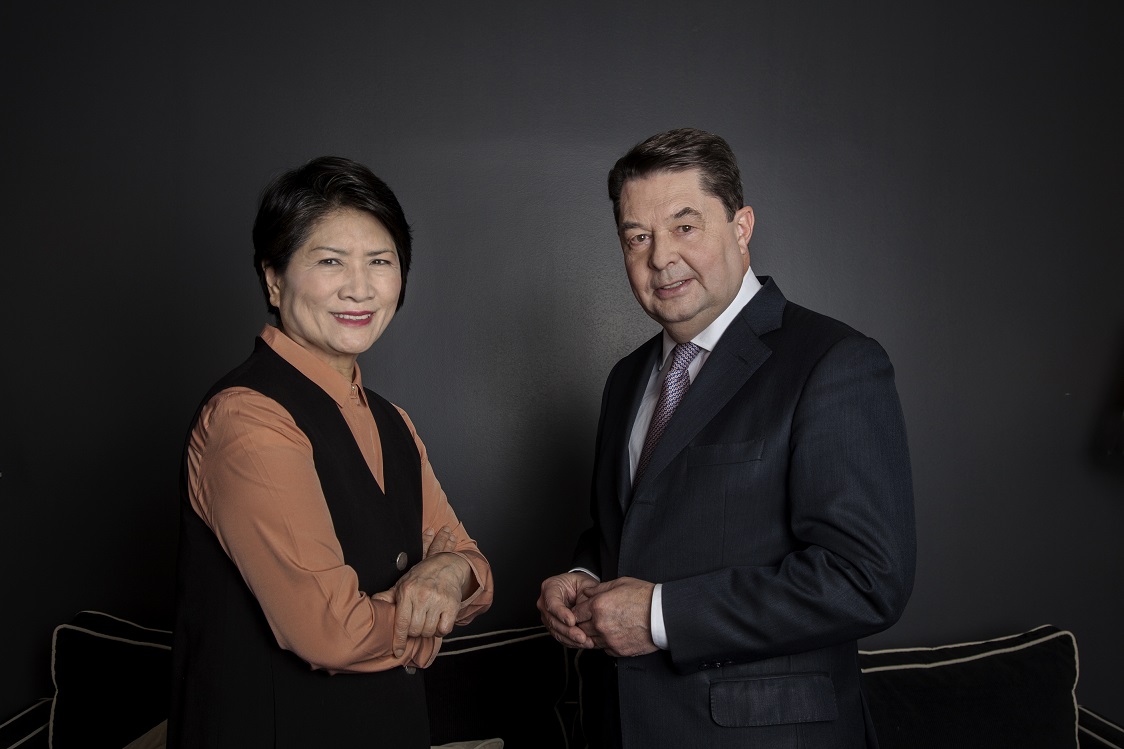
VISION, STRENGTH & STABILITY: TRUSTED FOUNDATIONS FOR FUTURE TOURISM
For the next leader of the UNWTO, the challenges will be great. Whoever takes the top job must navigate the organisation through dramatic changes taking place in the tourism world – travel policies, attitudes, technology. At the same time, he or she will need to demonstrate how the UNWTO will help shape a stronger tourism future for all – members, staff, partners, as well as travellers.
As staff and member states ponder over possible successors, curiosity and concern run parallel. The legacy of Taleb Rifai, outgoing Secretary General, is undeniable. In his two terms at the helm, in addition to step-changing the focus and delivery of the organization, Rifai has achieved unprecedented levels of trust, credibility, relevance and cohesion within the industry, and outside. The UN’s designation of 2017 as the International Year of Sustainable Tourism For Development, across all UN bodies, is testament to his success in raising the profile of the value of tourism, beyond the sector.
For his successor, strengthening this success is a must, while at the same time addressing any weaknesses. Fresh thinking is an expectation of new leadership. Evolution. But not revolution. The vision must be clear. It must be inspiring. It must be unifying. And it must be capable of carrying the sector forward for the benefit of all members.
One candidate has this principle firmly in place – South Korea’s nominee, AMBASSADOR DHO YOUNG-SHIM, a highly respected, delivery-focused, lifelong practitioner of tourism, within and outside the global UN system. Clear on the strengths and shortcomings of the UNWTO, and appreciative of the work done by the UNWTO in recent past under Rifai, to now shake its foundations with dramatic shifts in direction will risk not just the capability of the organisation, but its credibility.
To ensure growth with both strength and stability, Ambassador Dho’s priorities for the next stage of UNWTO leadership focus on inspired evolution, not revolution. Key to delivery: positioning her candidacy as a partnership, inviting as her running mate CARLOS VOGELER, a Venezuela-born Spanish national now operating as UNWTO Regional Director of the Americas and Executive Director for Member Relations.
This unique pairing of global, outside-in and inside-out experience and expertise gives UNWTO Executive Council members tasked with determining Rifai’s successor, a leadership combination that guarantees Rifai’s legacy acts as the foundations for a new era of UNWTO impact. Vision, strength, stability and shared commitment to an even more innovative, empowering tourism future for all – members, staff, and the wider global tourism community. It’s about leadership, not leaders.
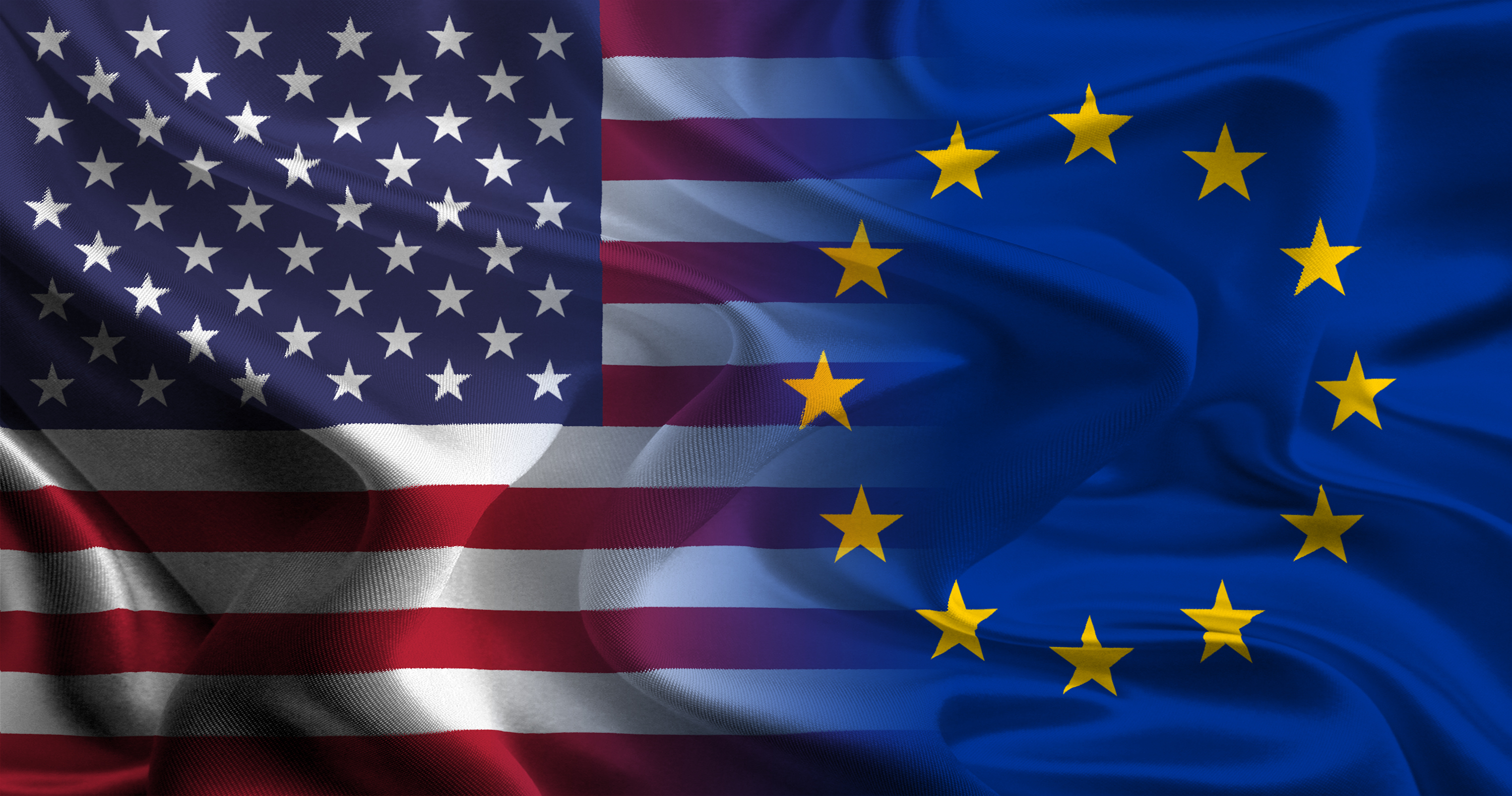
No imminent threat to visa-free travel from US to Europe, says ETOA
The European Parliament voted on 2nd March 2017 to require the European Commission to suspend visa exemption status for US citizens.
In ETOA’s view this is extremely unlikely to happen: the Council of the EU will object and the status quo will prevail.
The situation arises because, since 2014, citizens of Bulgaria, Croatia, Cyprus, Poland and Romania have needed a visa to visit the US. This means that there is not full reciprocity in treatment of EU and US citizens.
EU legislation provides for a ‘delegated act’ allowing the Commission to suspend exemption from visa requirements in the event of ‘non-reciprocity.’ This would apply to citizens of countries that impose visa requirement on EU citizens.
The Commission asked Parliament and Council to review the situation in April 2016.
Article 290 of the Treaty of Lisbon allows both the Council and Parliament to revoke such a delegated act, or object to its implementation. Given the Parliamentary vote, attention now switches to the Council.
Tom Jenkins, ETOA’s CEO commented:
“There is no imminent threat to current US-Europe visa waiver arrangements. So long as the US requires visas from some citizens of the EU, then the EU – as a whole – is obliged to reciprocate. The European Parliament is exploring the nature of that obligation.
Seldom has an inter-institutional dialogue contained such startling ideas. If the visa exemption were to be suspended it would inflict burdensome checks on the citizens of our most valuable ally, to certain retaliation and consequent economic detriment. Destination countries would have to hire thousands of staff to process millions of unnecessary visas.
At a time when absurdity and politics are bedfellows, we are being asked to contemplate folly cubed. The Council needs to block this quickly. Then the Commission can return to establishing reciprocity quietly, through the normal diplomatic channels.”
ETOA continues to work with its industry partners in Brussels to resist any reintroduction of visa requirements, and pushes for visa facilitation through reform of the Visa Code. With the prospect of ETIAS, a new pre-clearance system designed to enhance security, ETOA believes that the case for more countries to be granted visa-waiver status will strengthen.
